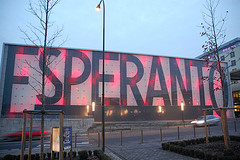Print  |
|


Esperanto: a language by choice !
Posted by Yevgeniya Amis on June 29, 2011

Yevgeniya (Ĵenja) Amis was born in Kiev, lived 5 years in Atlanta, and currently resides in Montreal. She was an editor of Kontakto, a socio-cultural Esperanto magazine read in over 90 countries, and is now actively involved in the work of the Esperantic Studies Foundation: www.esperantic.org.
When people learn that Esperanto is my family language, they very often ask why Esperanto rather than my first language (Russian), or that of my husband (English)? For me, as well as most other Esperanto speakers throughout the world, Esperanto is a language by choice, a language we decided to learn, and for some of us it happened to become a family language.
Why do people learn Esperanto ?
Every individual is unique and has their own reasons to learn Esperanto: some are idealists, and some tend to be more pragmatic, some enjoy the communication side, the others like to read original and translated literature in Esperanto.
I personally learned Esperanto out of linguistic curiosity, without knowing much of its cultural side. I then became really involved and inspired by the ideals of Esperanto after I participated in my first international seminar organized by the World Esperanto Youth Organization in Bulgaria about 10 years ago. There were about 30 people from a dozen countries. We all spoke Esperanto, and to my great joy, I was able to understand everything after only a few months of (not even intensive!) study.
Then there were other Esperanto seminars and more than five years working as an editor for an Esperanto magazine, which was a unique experience as it allowed me to collect articles from people all over the world and to give a unique perspective on social, political and cultural issues.
A different way to travel the world
Some Esperantists that I know decided to learn the language in order to travel. Actually, some of them even learned it before undertaking a world tour!
For example, I recently met Amanda Higley, a young American who participated in a 3-week intensive course, and right after that took off for Europe : she managed to visit over a dozen countries thanks to the Esperanto hosting/lodging service Pasporta Servo (www.pasportaservo.org).
Also, a few years ago, during the world Esperanto congress in Poland, I met Bruno and Maryvonne Robineau, a French couple and authors of the book “Eight years around the world”: during their trip, they used Esperanto extensively and were able to experience cultures as they wouldn’t have, had they chosen a more conventional way to travel. They participated in everyday life in different parts of the world, doing all kinds of work, from planting rice in Korea to teaching Esperanto in China.

Esperanto Hotel in Fulda – Photo : “fahrradfritze” (cc)
The dream of a world without language discrimination
For many Esperantists today, idealism continues to be the number one reason for learning the International Language. They believe that a world without language discrimination, where communication on a global scale is accessible to rich and poor alike, is possible.
Obviously, speakers of dominant languages, such as English, have enormous advantages compared to those who have to learn them. International organizations do nothing to change this situation or, rather, do everything to keep status quo. To give just one example, an international organization such as the UN has almost 200 member countries but only six official languages! And when it comes to working languages, there is just English and French…
That is why we believe that Esperanto contributes to eliminating language discrimination.
As any other society, we are not perfect, but we have a lot of things to be proud of: during the nearly 125 years history of the International Language, the Esperanto community has created a culture of its own, with its own traditions, music, literature, magazines, radios, Wikipedia with almost 150,000 articles, countless websites, and both national and international organizations (and even, believe it or not, bureaucracy!).
To study Esperanto online for free, see the multi-lingual Esperanto learning portal www.lernu.net that recently celebrated 100,000 registered users.








